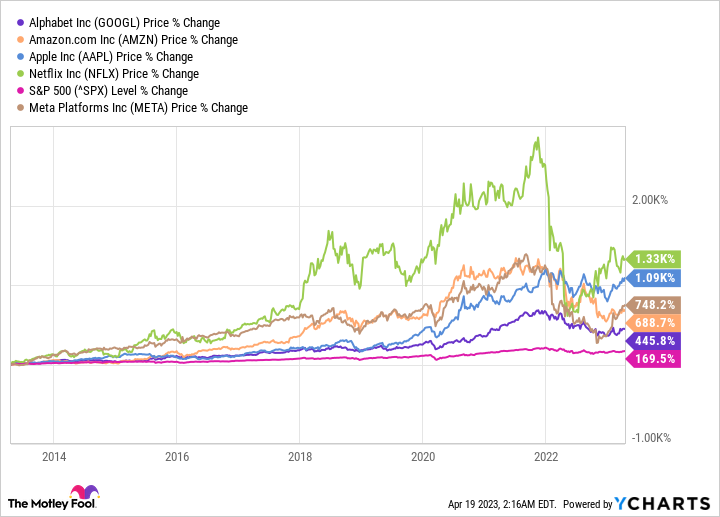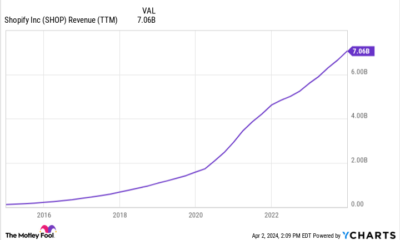The Fed Is Now Modeling a Recession: 1 FAANG Stock to Buy Hand Over Fist and 1 to Avoid

What a difference a year can make on Wall Street. In 2021, investors endured little pain, with the benchmark S&P 500 contending with no bigger than a 5% correction. In 2022, however, the S&P 500, along with the iconic Dow Jones Industrial Average and growth-focused Nasdaq Composite, all entered bear markets and produced their worst returns in 14 years.
This year, a new headwind has entered the picture. According to the minutes from the March Federal Open Market Committee (FOMC) meeting, the 12-member policymaking body that oversees open market operations is modeling a “mild recession” for later this year.
Image source: Getty Images.
Historically, recessions have been bad news for stocks, with the bulk of broad-market downside occurring after, not prior to, the declaration of a recession. But when volatility and uncertainty pick up on Wall Street, new and tenured investors tend to turn their attention to the FAANG stocks.
Investors flock to the FAANG stocks when there’s trouble
When I refer to the “FAANG stocks,” I’m talking about:
- Facebook, which is now a subsidiary of Meta Platforms
- Apple
- Amazon
- Netflix (NFLX 0.69%)
- Google, which is now a subsidiary of Alphabet (GOOGL 1.06%) (GOOG 0.84%)
The reason investors gravitate to the FAANGs is simple: They’re outperformers. Over the trailing 10 years (as of April 18, 2023), Netflix, Apple, Meta, Amazon, and Alphabet (Class A shares, GOOGL) have delivered respective returns of 1,330%, 1,090%, 748%, 689%, and 446%. By comparison, the S&P 500 is higher by 170%.
We’re also talking about a group of companies that are leaders within their respective industries and on the cutting edge of innovation.
- Meta Platforms is the company behind four of the most downloaded social media apps in the world (Facebook, WhatsApp, Instagram, and Facebook Messenger).
- Apple has been the world’s most valuable brand for 10 years running, per Interbrand, and is the leading provider of smartphones in the U.S.
- Amazon was expected to account for nearly 40% of U.S. online retail spending in 2022, according to eMarketer. That’s more than its 14 closest competitors, combined.
- Netflix is the domestic and international market-share leader in streaming services.
- Alphabet’s Google has a veritable monopoly in global internet search.
But even industry leaders can offer mixed returns during an economic downturn. If a U.S. recession does materialize later this year, one FAANG stock stands out as a surefire buy, while another would be best avoided.
The FAANG stock to buy hand over fist if the U.S. dips into a recession: Alphabet
If the FOMC is correct and the U.S. economy shifts into reverse in the second half of 2023, the FAANG stock that stands out as an incredible buy is Alphabet. It’s the parent company of Google, streaming service YouTube, and autonomous-vehicle company Waymo.
The biggest headwind Alphabet is dealing with is the advertising weakness that pretty much always accompanies economic uncertainty. Alphabet generates a sizable portion of its revenue from ads, so an economic downturn would be expected to weigh on sales and profit growth.
But as I’ve previously opined, this is a two-way street. Even though economic downturns are inevitable, every recession after World War II has lasted just two to 18 months. Comparatively, economic expansions are almost always measured in years. Since the U.S. economy spends a disproportionate amount of time expanding, ad-driven stocks tend to be smart buys during short-lived recessions.
Alphabet’s core operating segment continues to be Google. Since late 2018, Google has controlled no less than 91% of worldwide internet search share, per GlobalStats. With a 90 percentage-point lead over its closest competitor, Google typically commands excellent ad-pricing power.
However, the intrigue surrounding Alphabet has more to do with where the company is investing its abundant cash flow. For instance, Google Cloud has become the world’s No. 3 cloud infrastructure provider. Despite a challenging 2022, Google Cloud’s losses have narrowed, and the segment is generating in excess of $29 billion in annual run-rate sales.
YouTube is turning heads, as well. More than 50 billion YouTube Shorts are being watched daily — that’s up from around 30 billion during the first quarter of 2022 — which offers a potentially lucrative monetization opportunity. Further, YouTube is the second-most visited social platform in the world.
The cherry on the sundae for Alphabet is that, fundamentally, it’s the cheapest of all the FAANG stocks. Shares can be purchased right now for about 17 times Wall Street’s forecast earnings for 2024 and just 11 times estimated cash flow. Over the past five years, Alphabet has averaged a forward earnings multiple of 25.2 and a price-to-cash-flow multiple of 18.4. It’s simply never been this cheap as a publicly traded company.

Image source: Getty Images.
The FAANG stock to avoid if a U.S. recession arises: Netflix
On the other side of the aisle is the FAANG stock investors would be wise to avoid if the U.S. is headed into a recession: streaming-service behemoth Netflix.
In some ways, Netflix has impressed since the COVID-19 pandemic began. Most notably, the company has followed years of net cash outflows tied to its international expansion efforts by (finally) generating positive free cash flow. This was especially true during the first quarter, when Netflix produced a whopping $2.12 billion in free cash flow.
Netflix is also still the global leader in paid streaming memberships. As of the end of March, it had 232.5 million paid subscribers, which is a testament to the breadth of Netflix’s content library, as well as the intrigue of its original shows.
But it’s not all peaches and cream for the world’s top streaming service. One of Netflix’s biggest headwinds is the revenue it loses from password sharing.
The company previously announced plans to crack down on password sharing by introducing a paid sharing service that allows primary accounts to share their passwords with people outside their households — for a fee. Unfortunately, the handful of markets where this paid sharing service was tested initially resulted in net cancellations. Although the paid subscriber base in these test markets is now higher than when this paid sharing service began, the lesson seems like Netflix doesn’t have the pricing power it believes it does.
To build on this point, Netflix also lost subscribers last year after raising its monthly membership prices in the United States. While password sharing was a reason cited for this brief subscriber decline, it was a clear message from consumers that Netflix’s pricing power is waning, despite it being an industry leader.
Competition is another clear concern for Netflix. At the moment, its monthly subscription price point tends to be a bit higher than its competition. While this may not be a problem when the U.S. economy is firing on all cylinders, it could be a serious issue during a recession.
As a reminder, Paramount Global‘s Pluto TV ended 2022 with 79 million monthly active users and is a free, ad-supported platform. “Free” can be an extremely compelling price point if the U.S. economy shrinks.
Lastly, Netflix is a lot pricier than you might realize. On the surface, trading at 23 times forward-year earnings might not sound too bad. However, the FAANG stocks are known for aggressively reinvesting in their businesses, which is what makes cash flow a better measure of value for the group. Whereas Alphabet is cheaper than ever, based on Wall Street’s forward-year cash-flow estimates, Netflix is still pricey at 26 times next-year’s estimated cash flow.
With Netflix likely to lose market share as legacy TV networks expand their streaming offerings, smart investors should consider looking elsewhere if a recession arises.
Facebook Faces Yet Another Outage: Platform Encounters Technical Issues Again

Uppdated: It seems that today’s issues with Facebook haven’t affected as many users as the last time. A smaller group of people appears to be impacted this time around, which is a relief compared to the larger incident before. Nevertheless, it’s still frustrating for those affected, and hopefully, the issues will be resolved soon by the Facebook team.
Facebook had another problem today (March 20, 2024). According to Downdetector, a website that shows when other websites are not working, many people had trouble using Facebook.
This isn’t the first time Facebook has had issues. Just a little while ago, there was another problem that stopped people from using the site. Today, when people tried to use Facebook, it didn’t work like it should. People couldn’t see their friends’ posts, and sometimes the website wouldn’t even load.
Downdetector, which watches out for problems on websites, showed that lots of people were having trouble with Facebook. People from all over the world said they couldn’t use the site, and they were not happy about it.
When websites like Facebook have problems, it affects a lot of people. It’s not just about not being able to see posts or chat with friends. It can also impact businesses that use Facebook to reach customers.
Since Facebook owns Messenger and Instagram, the problems with Facebook also meant that people had trouble using these apps. It made the situation even more frustrating for many users, who rely on these apps to stay connected with others.
During this recent problem, one thing is obvious: the internet is always changing, and even big websites like Facebook can have problems. While people wait for Facebook to fix the issue, it shows us how easily things online can go wrong. It’s a good reminder that we should have backup plans for staying connected online, just in case something like this happens again.
Christian family goes in hiding after being cleared of blasphemy

LAHORE, Pakistan — A court in Pakistan granted bail to a Christian falsely charged with blasphemy, but he and his family have separated and gone into hiding amid threats to their lives, sources said.
Haroon Shahzad, 45, was released from Sargodha District Jail on Nov. 15, said his attorney, Aneeqa Maria. Shahzad was charged with blasphemy on June 30 after posting Bible verses on Facebook that infuriated Muslims, causing dozens of Christian families in Chak 49 Shumaali, near Sargodha in Punjab Province, to flee their homes.
Lahore High Court Judge Ali Baqir Najfi granted bail on Nov. 6, but the decision and his release on Nov. 15 were not made public until now due to security fears for his life, Maria said.
Shahzad told Morning Star News by telephone from an undisclosed location that the false accusation has changed his family’s lives forever.
“My family has been on the run from the time I was implicated in this false charge and arrested by the police under mob pressure,” Shahzad told Morning Star News. “My eldest daughter had just started her second year in college, but it’s been more than four months now that she hasn’t been able to return to her institution. My other children are also unable to resume their education as my family is compelled to change their location after 15-20 days as a security precaution.”
Though he was not tortured during incarceration, he said, the pain of being away from his family and thinking about their well-being and safety gave him countless sleepless nights.
“All of this is due to the fact that the complainant, Imran Ladhar, has widely shared my photo on social media and declared me liable for death for alleged blasphemy,” he said in a choked voice. “As soon as Ladhar heard about my bail, he and his accomplices started gathering people in the village and incited them against me and my family. He’s trying his best to ensure that we are never able to go back to the village.”
Shahzad has met with his family only once since his release on bail, and they are unable to return to their village in the foreseeable future, he said.
“We are not together,” he told Morning Star News. “They are living at a relative’s house while I’m taking refuge elsewhere. I don’t know when this agonizing situation will come to an end.”
The Christian said the complainant, said to be a member of Islamist extremist party Tehreek-e-Labbaik Pakistan and also allegedly connected with banned terrorist group Lashkar-e-Jhangvi, filed the charge because of a grudge. Shahzad said he and his family had obtained valuable government land and allotted it for construction of a church building, and Ladhar and others had filed multiple cases against the allotment and lost all of them after a four-year legal battle.
“Another probable reason for Ladhar’s jealousy could be that we were financially better off than most Christian families of the village,” he said. “I was running a successful paint business in Sargodha city, but that too has shut down due to this case.”
Regarding the social media post, Shahzad said he had no intention of hurting Muslim sentiments by sharing the biblical verse on his Facebook page.
“I posted the verse a week before Eid Al Adha [Feast of the Sacrifice] but I had no idea that it would be used to target me and my family,” he said. “In fact, when I came to know that Ladhar was provoking the villagers against me, I deleted the post and decided to meet the village elders to explain my position.”
The village elders were already influenced by Ladhar and refused to listen to him, Shahzad said.
“I was left with no option but to flee the village when I heard that Ladhar was amassing a mob to attack me,” he said.
Shahzad pleaded with government authorities for justice, saying he should not be punished for sharing a verse from the Bible that in no way constituted blasphemy.
Similar to other cases
Shahzad’s attorney, Maria, told Morning Star News that events in Shahzad’s case were similar to other blasphemy cases filed against Christians.
“Defective investigation, mala fide on the part of the police and complainant, violent protests against the accused persons and threats to them and their families, forcing their displacement from their ancestral areas, have become hallmarks of all blasphemy allegations in Pakistan,” said Maria, head of The Voice Society, a Christian paralegal organization.
She said that the case filed against Shahzad was gross violation of Section 196 of the Criminal Procedure Code (CrPC), which states that police cannot register a case under the Section 295-A blasphemy statute against a private citizen without the approval of the provincial government or federal agencies.
Maria added that Shahzad and his family have continued to suffer even though there was no evidence of blasphemy.
“The social stigma attached with a blasphemy accusation will likely have a long-lasting impact on their lives, whereas his accuser, Imran Ladhar, would not have to face any consequence of his false accusation,” she said.
The judge who granted bail noted that Shahzad was charged with blasphemy under Section 295-A, which is a non-cognizable offense, and Section 298, which is bailable. The judge also noted that police had not submitted the forensic report of Shahzad’s cell phone and said evidence was required to prove that the social media was blasphemous, according to Maria.
Bail was set at 100,000 Pakistani rupees (US $350) and two personal sureties, and the judge ordered police to further investigate, she said.
Shahzad, a paint contractor, on June 29 posted on his Facebook page 1 Cor. 10:18-21 regarding food sacrificed to idols, as Muslims were beginning the four-day festival of Eid al-Adha, which involves slaughtering an animal and sharing the meat.
A Muslim villager took a screenshot of the post, sent it to local social media groups and accused Shahzad of likening Muslims to pagans and disrespecting the Abrahamic tradition of animal sacrifice.
Though Shahzad made no comment in the post, inflammatory or otherwise, the situation became tense after Friday prayers when announcements were made from mosque loudspeakers telling people to gather for a protest, family sources previously told Morning Star News.
Fearing violence as mobs grew in the village, most Christian families fled their homes, leaving everything behind.
In a bid to restore order, the police registered a case against Shahzad under Sections 295-A and 298. Section 295-A relates to “deliberate and malicious acts intended to outrage religious feelings of any class by insulting its religion or religious beliefs” and is punishable with imprisonment of up to 10 years and fine, or both. Section 298 prescribes up to one year in prison and a fine, or both, for hurting religious sentiments.
Pakistan ranked seventh on Open Doors’ 2023 World Watch List of the most difficult places to be a Christian, up from eighth the previous year.
Morning Star News is the only independent news service focusing exclusively on the persecution of Christians. The nonprofit’s mission is to provide complete, reliable, even-handed news in order to empower those in the free world to help persecuted Christians, and to encourage persecuted Christians by informing them that they are not alone in their suffering.
Free Religious Freedom Updates
Join thousands of others to get the FREEDOM POST newsletter for free, sent twice a week from The Christian Post.
Individual + Team Stats: Hornets vs. Timberwolves
CHARLOTTE HORNETS MINNESOTA TIMBERWOLVES You can follow us for future coverage by liking us on Facebook & following us on X: Facebook – All Hornets X – …
Source link
-

 WORDPRESS7 days ago
WORDPRESS7 days agoTurkish startup ikas attracts $20M for its e-commerce platform designed for small businesses
-

 PPC7 days ago
PPC7 days agoA History of Google AdWords and Google Ads: Revolutionizing Digital Advertising & Marketing Since 2000
-

 MARKETING6 days ago
MARKETING6 days agoRoundel Media Studio: What to Expect From Target’s New Self-Service Platform
-

 SEO5 days ago
SEO5 days agoGoogle Limits News Links In California Over Proposed ‘Link Tax’ Law
-
SEARCHENGINES6 days ago
Daily Search Forum Recap: April 12, 2024
-

 MARKETING7 days ago
MARKETING7 days agoUnlocking the Power of AI Transcription for Enhanced Content Marketing Strategies
-

 SEARCHENGINES7 days ago
SEARCHENGINES7 days agoGoogle Search Results Can Be Harmful & Dangerous In Some Cases
-

 SEO4 days ago
SEO4 days ago10 Paid Search & PPC Planning Best Practices















